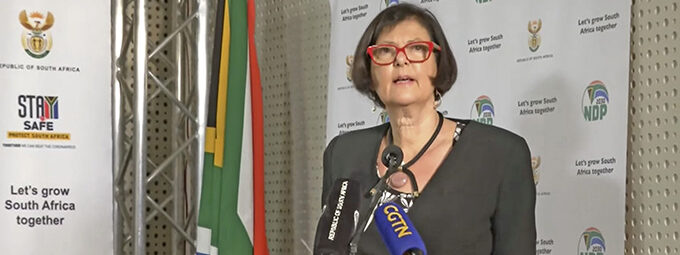Transport Minister Barbara Creecy says that private sector involvement in Transnet is nothing new, dismissing claims of a covert scheme to privatise assets of the key state-owned entity.
Speaking on the Sunday World Engage podcast, the minister responded candidly to critics who accuse her of orchestrating a “secret plot” to hand over South Africa’s strategic rail and port infrastructure to private interests.
Scenario dates back to 1975
“We have had private sector terminal operators in the ports since 1975 under Transnet,” she stated.
“And some of the vociferous opponents were also the former CEOs of Transnet who presided over that private sector participation. So I think one needs to be consistent,” she said.
“My approach is about reform and revitalisation, not selling off the family silver,” Creecy said. She was addressing the persistent narrative that government is preparing to privatise Transnet’s most valuable assets.
“People have said to me, ‘Why are you selling the family silver?’ I’m not. We’re not selling anything.”
The controversy has been fuelled by concerns over the government’s recent moves to invite private sector participation in the operation of port terminals and the upgrade of railway lines. Critics, including some former Transnet executives, have accused the Department of Transport of opening the door to privatisation by stealth.
Unprecedented challenges
The minister argued that South Africa’s rail and port infrastructure faces unprecedented challenges. Urgent investment is needed to restore its competitiveness.
“I don’t know how much more evidence we need than what we have had over the last three or four years. That Transnet on its own is not going to get us back to where we were in 2018, before the Covid-19 pandemic.”
Creecy pointed to research showing growing demand for efficient freight transport. “There’s recent research that indicates the appetite is as much as 300 million tonnes,” she noted.
Yet, as she made clear, the government’s finances are under severe strain. And this is limiting its ability to fund the massive upgrades required.
“The Fiscus is not in good shape. The Minister of Finance has made it absolutely plain to me there aren’t going to be bailouts.”
One of the key reforms under consideration is the shift from the current Cape gauge — a narrow railway line — to standard gauge, which would accommodate bigger trains and more cargo.
Cape gauge to Standard gauge
“If we want, for example, to move from the current situation, which is what we call Cape gauge, to standard gauge, then you’re going to need fairly major investment,” Creecy said. She emphasised that such upgrades are critical if South Africa is to keep pace with global standards.
To illustrate her point, Creecy drew a parallel with the road sector, where public-private partnerships have long been accepted.
“Now let me draw a parallel for you that we’ve all lived with and we don’t have a problem with. And that is the situation with the concessions on the same road network for industry. Those are concessions,” she said.
“What is happening is that the N4 will shortly be returning to the state in good condition.”
She reiterated that, while the private sector can help fund and operate certain aspects, the state will retain ownership and play a crucial regulatory role.
Haphazard privatisation
“The real issue is there does need to be state ownership of the infrastructure in order to regulate and ensure interoperability,” Creecy stressed.
The minister also warned against repeating the mistakes seen in other countries. This is where haphazard privatisation led to fragmented railway systems.
“There are some not very good examples of rail reform elsewhere in the world. That’s where they sold this line to this one, and that line to that one. And now you can’t run trains on each other’s lines. We don’t want that.”




